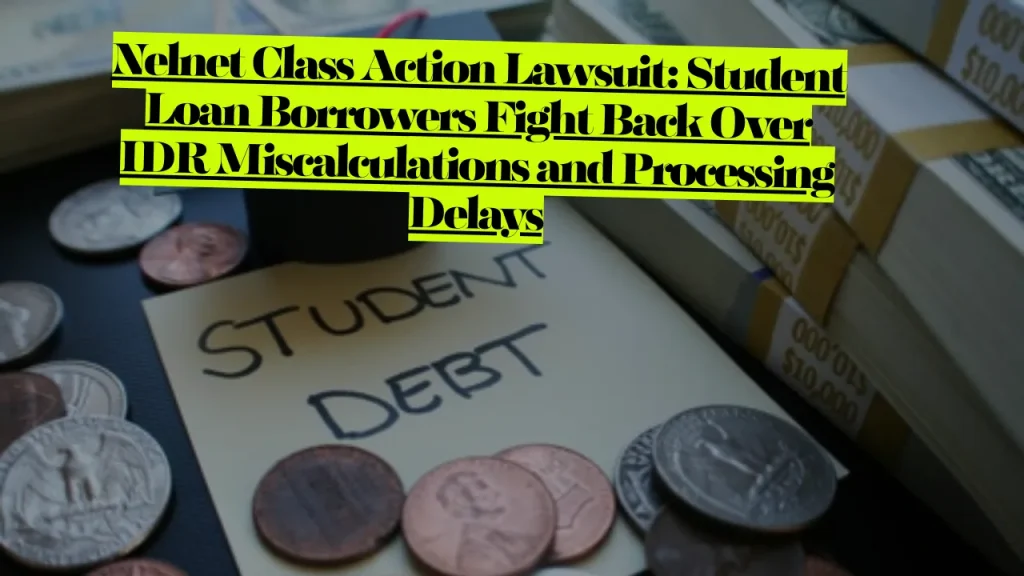Nelnet Class Action Lawsuit, Student Loan Borrowers Fight Back Over IDR Miscalculations and Processing Delays
Student loan servicer Nelnet miscalculated one borrower’s monthly payment at nearly $2,000—when the correct amount should have been $583. That error cost her a mortgage approval and damaged her credit score for months. She’s far from alone.
Multiple class action lawsuits now target Nelnet over systematically miscalculated income-driven repayment plans, delayed application processing, and false credit reporting that has financially harmed thousands of federal student loan borrowers across America.
What Is the Nelnet Class Action Lawsuit About?
Nelnet, one of the nation’s four largest federal student loan servicers, faces several active lawsuits alleging the company has systematically failed borrowers enrolled in income-driven repayment plans. Here’s what borrowers claim:
Gross miscalculation of monthly payments. A June 2024 lawsuit alleges Nelnet calculated wildly inflated monthly payment amounts for borrowers on SAVE and PAYE plans, making it impossible for some to meet their obligations or qualify for mortgages.
Delayed IDR application processing. A 2020 Nebraska federal lawsuit claims Nelnet systematically delayed or failed to process applications for income-driven repayment plan modifications, causing interest to capitalize and loan balances to increase by tens of thousands of dollars.
False credit reporting. Even after borrowers disputed incorrect payment amounts, Nelnet allegedly continued reporting the inflated figures to credit bureaus, damaging credit profiles and blocking access to mortgages, car loans, and other credit opportunities.
Improper IDR cancellations. Earlier lawsuits claim Nelnet cancelled borrowers’ income-driven repayment plans before renewal deadlines, forcing them into more expensive standard repayment plans without proper notice.
Data breach exposure. In 2022, Nelnet disclosed a data breach affecting over 2.5 million borrowers whose Social Security numbers, names, addresses, and contact information were compromised due to inadequate security measures.
Nelnet services federal student loans for the U.S. Department of Education and receives monthly fees for each loan it manages—creating what plaintiffs allege is a financial incentive to delay forgiveness and extend loan durations.
Who Is Affected by the Nelnet Lawsuits?
Primary plaintiffs include:
- Federal student loan borrowers enrolled in income-driven repayment plans (IDR) including SAVE, PAYE, IBR, and ICR plans
- Borrowers who submitted IDR applications or annual recertifications that Nelnet delayed or failed to process
- West Virginia residents who had loans serviced by Nelnet and experienced miscalculated monthly payments
- EdFinancial and OSLA customers affected by the 2022 data breach
- Borrowers placed in forbearance status while Nelnet “recalculated” payments
You may have legal claims if:
- Your monthly IDR payment amount was significantly higher than 10% of your discretionary income
- You submitted complete IDR applications or recertifications that weren’t processed for months
- You were denied credit (mortgage, car loan, credit card) because Nelnet reported inflated monthly payment amounts
- Interest capitalized on your loans due to processing delays
- You received notice of the 2022 data breach affecting EdFinancial or OSLA accounts
The lawsuits seek to represent potentially hundreds of thousands of borrowers nationwide who experienced similar problems with Nelnet’s servicing practices.
Related Lawsuit: Optimum Lawsuit, What’s Happening and What You Need to Know

The $1.8 Million Massachusetts Settlement (2024)
In January 2024, Nelnet paid $1.8 million to resolve allegations by Massachusetts Attorney General Andrea Joy Campbell that the company failed to properly communicate with borrowers about renewing income-driven repayment plans.
What Nelnet did wrong: Between 2013 and 2017, Nelnet sent notices that failed to comply with federal regulations requiring:
- At least 60 days’ notice before recertification deadlines
- Clear explanation of consequences for missing deadlines
- Estimated payment increases if borrowers failed to recertify
Some borrowers received no notices at all, causing them to miss recertification deadlines and losing valuable interest benefits and forgiveness progress.
Settlement terms:
- $1 million to Massachusetts General Fund
- $800,000 to Student Loan Trust Fund
- Agreement to comply with all federal notice requirements
- Implementation of improved business practices for Massachusetts borrowers
- Retention of copies of all written communications to borrowers
This settlement demonstrates state-level enforcement against student loan servicers, though it provides no direct compensation to affected borrowers.
The West Virginia Payment Miscalculation Case (2024)
A June 2024 class action lawsuit filed in West Virginia federal court alleges Nelnet has repeatedly and grossly miscalculated monthly repayment amounts for borrowers enrolled in income-driven repayment plans.
The case of Amanda Stevens: The lead plaintiff enrolled in a SAVE plan with approximately $35,000 in student loan debt and a gross monthly income of $5,833.32. Under SAVE rules, her payment should have been roughly 10% of discretionary income—approximately $583 per month.
Instead, Nelnet calculated her monthly payment at more than $1,969.
Real-world consequences:
- In January 2024, Stevens was denied a mortgage loan because Nelnet reported to credit bureaus she owed nearly $2,000 monthly to the servicer
- The reported debt ratio exceeded the 50% debt-to-income limit required for mortgage approval
- Even after Stevens filed detailed disputes showing the miscalculation, Nelnet verified the incorrect information to credit reporting bureaus
The lawsuit alleges Nelnet is “well aware” it has incorrectly calculated payments but continues to report false information while placing borrowers in “administrative forbearance” during supposed recalculations.
Legal claims: The suit accuses Nelnet of failing to reasonably investigate disputes and permitting factually inaccurate payment information to remain on borrowers’ credit reports, violating the Fair Credit Reporting Act.
The proposed class includes all West Virginia consumers who had loans serviced by Nelnet within the applicable statute of limitations and for whom Nelnet calculated monthly payments for income-based repayment plans.

The Nebraska IDR Processing Delay Lawsuit (2020)
Filed as Johanson v. Nelnet (Case No. 4:20-CV-03069) in Nebraska federal court, this comprehensive class action claims Nelnet systematically failed to process applications for income-driven repayment plan modifications and renewals.
What happened to borrowers: Five plaintiffs from Illinois, Missouri, Texas, Colorado, and Michigan—all enrolled in IDR plans—submitted complete applications and required documents, sometimes multiple times, but experienced:
- Excuses and delays from Nelnet customer service
- Lack of processing attention despite repeated submissions
- Involuntary placement in forbearance status
- Interest capitalization that increased total loan balances
- Loss of progress toward loan forgiveness
Example: Andrew Johansson mailed annual recertifications and tax records to continue income-driven payments but was involuntarily switched to a standard repayment plan. He resubmitted applications and was eventually approved but placed in hardship forbearance as a penalty for Nelnet’s failure to process matters properly. He claims this increased his interest costs by more than $25,000.
Why Nelnet allegedly delayed applications: The lawsuit contends Nelnet receives monthly servicing fees for each federal loan it administers, creating financial incentive to keep loans active as long as possible. By delaying IDR application processing, payments only count toward forgiveness once applications are processed—extending loan durations and increasing Nelnet’s revenue.
Court ruling: In 2021, Chief Judge John M. Gerrard ruled the class action complaint contained plausible allegations outlining a case against Nelnet, allowing the lawsuit to proceed to discovery. The case remains pending, with class certification still under consideration.
The CARES Act Misleading Lawsuit (2020)
A September 2020 class action (Isner-Monticello v. Nelnet, Case No. 8:20-cv-02135-MSS-TGW, Middle District of Florida) alleges Nelnet misled borrowers into believing their student loans were federally backed and eligible for CARES Act relief when they were actually private loans.
Lead plaintiff Kimberly Isner-Monticello, a licensed attorney in Florida, financed her Juris Doctor degree from Stetson University College of Law through Nelnet. She claims Nelnet representatives left her believing the loans were federally held.
When the CARES Act suspended federal student loan payments during COVID-19, Isner-Monticello learned her Nelnet loans weren’t eligible for deferment because they were private—not federally backed.
Legal violations alleged:
- False representation of affiliation with the U.S. Department of Education
- Violations of the Fair Debt Collection Act
- Violations of Florida’s Consumer Collections Practices Act
- Threatening to collect debt when knowing the debt characteristics were misrepresented
- Falsely representing the character, amount, and legal status of debts
The plaintiff claims she lost work time calling and inquiring about CARES Act deferment that was never available for her loans.
The 2022 Data Breach Class Action
In August 2022, EdFinancial and OSLA (both serviced by Nelnet) began notifying over 2.5 million borrowers that their sensitive personal information had been exposed through unauthorized access to Nelnet’s computer systems.
Information compromised: Social Security numbers, full names, physical addresses, email addresses, and phone numbers—all unencrypted and unredacted.
What went wrong: Plaintiff Michael Varlotta alleges Nelnet failed to implement adequate security protocols and delayed notifying affected borrowers, allowing criminals to immediately use the stolen information to:
- Steal identities
- File fraudulent tax returns
- Apply for credit cards in victims’ names
Legal claims:
- Negligence in safeguarding personally identifiable information
- Invasion of privacy
- Violations of consumer protection laws in multiple states
On January 30, 2023, U.S. Magistrate Judge Cheryl Zwart consolidated 23 pending data breach actions against Nelnet and appointed co-lead class counsel. The case (Varlotta v. Nelnet Servicing LLC, Case No. 4:22-cv-03188, District of Nebraska) remains in litigation.

Are There Any Nelnet Settlements Available Now?
As of November 2025, no settlement payments are currently available to affected Nelnet borrowers from the active class action lawsuits. The Massachusetts $1.8 million settlement went to state funds, not individual borrowers.
However, several cases remain in active litigation:
- West Virginia IDR miscalculation case (filed June 2024)
- Nebraska IDR processing delay case (pending since 2020, awaiting class certification)
- Florida CARES Act misrepresentation case (status uncertain)
- Nebraska data breach consolidation (active litigation)
If any settlements are reached in these cases, affected borrowers will receive notice through mail or email if they meet class member definitions.
What Should Affected Borrowers Do Now?
Document everything immediately:
- Save all billing statements showing payment amounts calculated by Nelnet
- Print or screenshot correspondence about IDR applications or recertifications
- Keep copies of income documentation you submitted
- Document dates and content of customer service calls
- Obtain copies of your credit reports showing reported payment amounts
Check your IDR payment calculation: Use the Federal Student Aid IDR calculator to estimate what your payment should be based on income and family size. If Nelnet’s calculated amount is significantly higher, you may have a claim.
Dispute credit report errors: If Nelnet reported incorrect payment amounts to credit bureaus, file disputes with Experian, Equifax, and TransUnion. Include documentation showing the miscalculation.
File complaints:
- Consumer Financial Protection Bureau: Submit complaints at consumerfinance.gov/complaint about payment miscalculations or processing delays
- Federal Student Aid Ombudsman: Email [email protected] for borrowers affected by the Sweet v. McMahon settlement who have servicer issues
- State Attorney General: Contact your state AG’s consumer protection division with documented servicing failures
Monitor class action developments: Check websites of law firms handling Nelnet cases (Domina Law Group, ClassAction.org) for updates on class certification and settlement announcements.
Consider individual legal action: While most federal student loan servicing agreements include arbitration clauses, affected borrowers may pursue:
- Individual arbitration claims for damages caused by miscalculations or processing delays
- Credit reporting violations under the Fair Credit Reporting Act
- State consumer protection law claims depending on where you live
How Do Income-Driven Repayment Plans Work?
Understanding IDR plans is crucial to recognizing when Nelnet has miscalculated your payments.
Available IDR plans:
- SAVE (Saving on a Valuable Education): 10% of discretionary income for undergraduate loans
- PAYE (Pay As You Earn): 10% of discretionary income, never more than standard 10-year payment
- IBR (Income-Based Repayment): 10-15% of discretionary income depending on when you borrowed
- ICR (Income-Contingent Repayment): Lesser of 20% of discretionary income or what you’d pay on fixed 12-year plan
Discretionary income = Your adjusted gross income minus 150% (or 225% for SAVE) of the federal poverty guideline for your family size and state.
Example calculation for SAVE plan:
- Annual income: $70,000
- Family size: 1
- 2024 poverty guideline for individual: $15,060
- 225% of poverty guideline: $33,885
- Discretionary income: $70,000 – $33,885 = $36,115
- Monthly discretionary income: $36,115 ÷ 12 = $3,009.58
- 10% for monthly payment: $300.96
If Nelnet calculates your payment at $1,000+ monthly with similar figures, that’s a red flag for gross miscalculation.
Why Nelnet’s Delays and Errors Matter
The consequences of Nelnet’s alleged failures extend far beyond administrative inconvenience:
Financial harm:
- Interest capitalization can add thousands to loan balances
- Delayed forgiveness means years of additional payments
- Miscalculated payments reported to credit bureaus block access to mortgages, car loans, and credit cards
Loan forgiveness impact: Income-driven repayment plans offer forgiveness after 20-25 years of qualifying payments. Every month Nelnet delays processing applications is a month that doesn’t count toward forgiveness—potentially extending repayment by years.
Credit score damage: False payment amounts reported as “owed” to Nelnet increase debt-to-income ratios and can lower credit scores by 50-100 points, affecting everything from housing to employment opportunities.
Public Service Loan Forgiveness (PSLF): Borrowers working in qualifying public service jobs need 120 qualifying payments. Processing delays mean missing PSLF eligibility windows that can never be recovered.
Comparing Nelnet to Other Servicer Lawsuits
Nelnet isn’t the only federal student loan servicer facing legal challenges:
MOHELA: Subject to complaints in the Sweet v. McMahon borrower defense settlement, with court orders requiring improved complaint handling processes.
Navient: Paid $1.85 billion in a 2022 settlement with 39 state attorneys general over allegations it steered borrowers into costly forbearances instead of income-driven repayment plans.
FedLoan Servicing: Faced multiple lawsuits over PSLF tracking errors before transferring all loans to MOHELA in 2021.
The pattern across servicers suggests systemic issues in the federal student loan servicing industry that harm millions of borrowers and cost taxpayers billions.
Frequently Asked Questions
Is the Nelnet class action lawsuit still open?
Multiple Nelnet lawsuits remain in active litigation as of November 2025. The West Virginia IDR miscalculation case filed in June 2024 and the Nebraska IDR processing delay case from 2020 are both pending. No settlements have been finalized that would close these cases.
How do I know if I’m part of the Nelnet class action?
You don’t need to “join” a class action when it’s initially filed. If courts certify the classes and you meet the definitions, you’ll receive notice by mail or email. Generally, you may qualify if you had federal loans serviced by Nelnet and experienced IDR payment miscalculations, processing delays, or were affected by the 2022 data breach.
Can I get money from the Massachusetts Nelnet settlement?
No. The $1.8 million Massachusetts settlement went to state funds, not individual borrowers. It required Nelnet to improve business practices but provided no direct compensation to affected consumers.
What should I do if Nelnet miscalculated my payment?
First, use the Federal Student Aid IDR calculator to verify the correct amount. Then file disputes with credit bureaus if incorrect amounts were reported. Submit complaints to the CFPB and your state Attorney General. Consider consulting a consumer protection attorney about individual legal claims.
Will I owe taxes on any Nelnet settlement?
Generally, yes. If you receive settlement payments for economic damages (lost money, increased loan balances), those amounts are typically taxable income. However, compensation for emotional distress or punitive damages may have different tax treatment. Consult a tax professional if you receive settlement funds.
How long does it take to resolve student loan servicing lawsuits?
Complex class actions often take 3-5 years from filing to settlement. The Nebraska Nelnet case filed in 2020 is still pending class certification. Even after settlement approval, distributing payments can take an additional 6-12 months.
What is the statute of limitations for suing Nelnet?
It varies by state and claim type. Consumer protection violations typically have 2-4 year statutes of limitations from when you discovered the harm. Credit reporting violations must be filed within 2 years of the violation. Consult an attorney promptly if you believe you have claims, as deadlines can expire quickly.
Can Nelnet retaliate against me for filing complaints?
No. Federal and state laws prohibit servicers from retaliating against borrowers who file legitimate complaints with government agencies or pursue legal remedies. However, document all interactions in case you need to prove retaliation occurred.
Key Takeaways
Student loan servicing failures at Nelnet have caused significant financial harm to borrowers who trusted the company to accurately calculate payments and process applications promptly. Multiple active lawsuits demonstrate patterns of miscalculation, delay, and inadequate security practices.
If you’re a Nelnet borrower, verify your IDR payment calculations independently, document all interactions, and report problems to the CFPB and your state Attorney General. These complaints strengthen enforcement actions that can result in systemic changes and potential compensation.
The student loan servicing system requires fundamental reform to protect borrowers from administrative failures that add years to repayment and thousands to loan balances. Until that happens, affected borrowers must be vigilant in monitoring their accounts and asserting their rights when servicers fail to meet their obligations.
Related Articles:
- Can You Sue for Identity Theft? Legal Claims, Damages, Your Rights Explained
- Facebook Lawsuit Payout Latest: Active Settlements, Eligibility, Payout Amounts
- Wells Fargo Class Action Lawsuits 2025: $2 Billion in Settlements
- Can You Sue a Bank for Identity Theft? Legal Standards, Consumer Protection Laws
- TurboTax Faces Multiple Class Actions: Free Filing Fraud, Data Breaches, Privacy Violations
Disclaimer: This article provides general information about ongoing legal matters involving Nelnet. It is not legal advice. Consult an attorney for guidance about your specific situation.
About the Author

Sarah Klein, JD, is a licensed attorney and legal content strategist with over 12 years of experience across civil, criminal, family, and regulatory law. At All About Lawyer, she covers a wide range of legal topics — from high-profile lawsuits and courtroom stories to state traffic laws and everyday legal questions — all with a focus on accuracy, clarity, and public understanding.
Her writing blends real legal insight with plain-English explanations, helping readers stay informed and legally aware.
Read more about Sarah
